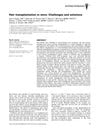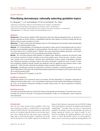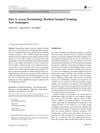 4 citations,
January 2011 in “Current problems in dermatology”
4 citations,
January 2011 in “Current problems in dermatology” At-home laser and light devices can safely reduce acne and hair growth when used correctly but are less effective than professional treatments.
 3 citations,
June 2022 in “Plastic & Reconstructive Surgery”
3 citations,
June 2022 in “Plastic & Reconstructive Surgery” Both endoscopic and pretrichial open forehead lifts effectively elevate eyebrows long-term with high patient satisfaction.
 3 citations,
April 2019 in “Annals of hepatology”
3 citations,
April 2019 in “Annals of hepatology” Peanut allergies can be transferred through organ transplants.
 3 citations,
April 2019 in “Hormone and Metabolic Research”
3 citations,
April 2019 in “Hormone and Metabolic Research” Women with PCOS have lower adiponectin hormone levels and are more likely to have insulin resistance.
 3 citations,
July 2018 in “African Journal of Urology”
3 citations,
July 2018 in “African Journal of Urology” Finasteride before TURP reduces blood loss and slightly improves early postoperative quality of life.
 3 citations,
January 2018 in “İstanbul Kuzey Klinikleri”
3 citations,
January 2018 in “İstanbul Kuzey Klinikleri” Hair loss was found in 37.4% of surveyed rural high-school students in Eskisehir, Turkey, affecting their quality of life, especially in general health and mental well-being.
 3 citations,
April 2016 in “Wound Repair and Regeneration”
3 citations,
April 2016 in “Wound Repair and Regeneration” Researchers successfully transplanted hair follicles in mice, which survived well and helped in wound healing.
 3 citations,
August 2014 in “Journal of The European Academy of Dermatology and Venereology”
3 citations,
August 2014 in “Journal of The European Academy of Dermatology and Venereology” Dutch dermatologists prioritized skin conditions like melanoma and psoriasis for guideline development, focusing on consistent care over cost or death rates.
 3 citations,
July 2011 in “Expert Review of Dermatology”
3 citations,
July 2011 in “Expert Review of Dermatology” Effective treatments for excessive hair growth in women include creams, laser therapy, and medications, with the choice depending on individual needs and potential side effects.
 3 citations,
January 2007 in “Elsevier eBooks”
3 citations,
January 2007 in “Elsevier eBooks” The document concludes that individualized treatment and lifestyle changes are important for managing menopause symptoms and health risks.
 3 citations,
November 2005 in “Dermatologic Surgery”
3 citations,
November 2005 in “Dermatologic Surgery” Aminoguanidine increases a specific growth signal in stored hair grafts, which may help them survive better after being transplanted.
 3 citations,
September 2002 in “Dermatologic Surgery”
3 citations,
September 2002 in “Dermatologic Surgery” The evaluation system improved patient selection for hair loss surgery, leading to better results and satisfaction.
 2 citations,
October 2023 in “Dermatology and therapy”
2 citations,
October 2023 in “Dermatology and therapy” Alopecia areata severely impacts quality of life, causing anxiety, depression, and work impairment.
 2 citations,
August 2022 in “Federal Practitioner”
2 citations,
August 2022 in “Federal Practitioner” A severe medication reaction required long treatment and led to hair loss and thyroid issues.
 2 citations,
August 2020 in “Journal of Cosmetic Dermatology”
2 citations,
August 2020 in “Journal of Cosmetic Dermatology” Higher granulysin levels in the blood are linked to more severe hair loss in alopecia areata patients, and these levels decrease after effective treatment.
 2 citations,
March 2017 in “Veterinary dermatology”
2 citations,
March 2017 in “Veterinary dermatology” Herbal paste and oil extract might improve dog hair quality by retaining lipids.
 2 citations,
January 2017 in “Annals of Dermatology”
2 citations,
January 2017 in “Annals of Dermatology” Taking 5-alpha reductase inhibitors does not increase breast cancer risk in men.
 2 citations,
December 2015 in “International Journal of Dermatology”
2 citations,
December 2015 in “International Journal of Dermatology” Washing test helps identify hair loss type, low iron levels significant.
 2 citations,
March 2015 in “Expert opinion on orphan drugs”
2 citations,
March 2015 in “Expert opinion on orphan drugs” New treatments for hair loss show promise but need more research to confirm safety and effectiveness.
 2 citations,
January 2014 in “Springer eBooks”
2 citations,
January 2014 in “Springer eBooks” Polycystic Ovary Syndrome (PCOS) often leads to severe acne, and lifestyle changes and hormonal treatments can help manage it.
 2 citations,
January 2010 in “Hormone Molecular Biology and Clinical Investigation”
2 citations,
January 2010 in “Hormone Molecular Biology and Clinical Investigation” Low dose finasteride decreases certain steroids, possibly increasing depression risk.
 2 citations,
March 2004 in “Reviews in Gynaecological Practice”
2 citations,
March 2004 in “Reviews in Gynaecological Practice” Hormonal changes and psychological issues can cause sexual dysfunction in postmenopausal women. Behavioral therapy is recommended first, with hormone replacement helping some symptoms but not libido. Testosterone can improve libido, but its effects on overall sexual function are unclear. Emotional and relationship issues should be addressed before using medication, and the benefits and risks of testosterone supplementation should be considered.
 2 citations,
October 1997 in “Dermatologic Clinics”
2 citations,
October 1997 in “Dermatologic Clinics” The document concludes that advancements in hair restoration surgery have led to more natural results and patient satisfaction, with hope for future improvements in treatment.
 1 citations,
March 2021 in “Skin health and disease”
1 citations,
March 2021 in “Skin health and disease” Better hair loss models needed for research.
 1 citations,
January 2020 in “Journal of Crohn's and colitis”
1 citations,
January 2020 in “Journal of Crohn's and colitis” Many people with inflammatory bowel disease have a vitamin C deficiency, which can lead to scurvy symptoms.
 1 citations,
July 2018 in “Current Sexual Health Reports”
1 citations,
July 2018 in “Current Sexual Health Reports” Post-finasteride Syndrome causes lasting negative effects, but more research is needed for treatment and risk evaluation.
 1 citations,
April 2018 in “The journal of investigative dermatology/Journal of investigative dermatology”
1 citations,
April 2018 in “The journal of investigative dermatology/Journal of investigative dermatology” Oral tofacitinib significantly improves lichen planopilaris symptoms without adverse effects.
 1 citations,
January 2018 in “Journal of Gynecologic Surgery”
1 citations,
January 2018 in “Journal of Gynecologic Surgery” Removing both ovaries can treat increased testosterone and related symptoms in postmenopausal women with ovarian hyperthecosis.
 1 citations,
May 2017 in “InTech eBooks”
1 citations,
May 2017 in “InTech eBooks” Some natural remedies may help with hair regrowth, but more research is needed to confirm their effectiveness and safety.
 1 citations,
March 2016 in “Current Dermatology Reports”
1 citations,
March 2016 in “Current Dermatology Reports” New evaluation tools are needed for better surgical training in dermatology residency programs.






























